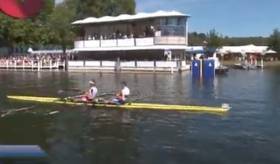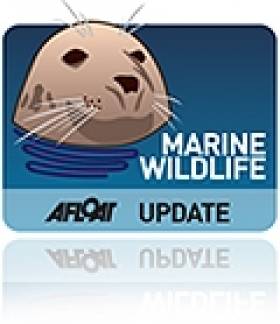Displaying items by tag: Queen's University Belfast
Over 180 Deep Sea Species Studied by Queen's University Belfast Scientists Added to "Red List" of Threatened Species
New research from Queen’s University Belfast has led to 184 deep-sea species being added to the global “Red List” of threatened species.
The International Union for Conservation of Nature (IUCN) is the world’s foremost conservation authority, and its “red list” categorises universally recognised extinction risk categories.
More than 140,000 species have been “red listed”, but less than 15% are from marine environments and barely any have been from the deep sea, the QUB scientists point out.
The scientists examined mollusc species in hydrothermal vents, a unique deep sea ecosystem which is the equivalent in density of life as tropical rainforests or coral reefs.
 A deep-sea Hydrothermal vent taken by a Remotely Operate Vehicle (ROV). Photo: Marum Universitat Bremen
A deep-sea Hydrothermal vent taken by a Remotely Operate Vehicle (ROV). Photo: Marum Universitat Bremen
There are about 600 hydrothermal vents known, most being about a third of a football field in size.
The scientists assessed 184 “vent-endemic” mollusc species and found 114 or 62 per cent were threatened by deep-sea mining.
They found a further 45 species (24.4%) are listed as “near threatened”, while only 13.6% of species are listed as of “least concern”, under the protection of marine protected areas (MPAs).
“The deep sea is the largest environment on earth with thousands of unique species living in extreme habitats,” the scientists said.
“ The remoteness of these seafloor habitats means they are often understudied, making it difficult to understand and communicate their conservation requirements,” they said.
“There is growing industrial interest in the deep sea, including deep-sea mining for commercially important metals, meaning it is now vital to protect these unique, insular ecosystems and their specialist endemic species,” they said.
The research was supported by the Marine Institute and involved an international team from the USA, Canada, Japan and Britain.
QUB PhD student, Elin Thomas, who is lead researcher, said the teams focus was on “assessing species found at hydrothermal vents, as these areas are increasingly targeted for their natural resources, and we wanted to better understand the threat this poses to the rich marine life found there”.
“As one of the dominant species groups at vent habitats.... we focused our study on molluscs,” Thomas said.
“Almost two-thirds of the molluscs are listed as threatened, which illustrates the urgent need to protect these species from extinction,” she said.
“Indian Ocean vent molluscs are under the greatest extinction risk, with 100% of species listed in threatened categories and 60% as critically endangered,” Thomas pointed out,
She noted that this “coincides with the distribution of mining contracts granted by the International Seabed Authority”
“We found that seabed management and mining regulation consistently had the greatest impact on a species’ extinction risk so we need regulations in place as a matter of urgency. This research should be used to develop new policies to protect these species before it is too late,” Thomas said.
“It’s vital that we continue to deepen our understanding of the marine environment before it’s too late for too many species,” she said.
The research has been published in the scientific journal Frontiers in Marine Science.
Queen's Sculler Hull Eases Into Next Round at Henley
#Rowing: Nathan Hull of Queen’s University, Belfast, and Olly Dix of Leander won their heat of the Double Sculls convincingly at Henley Royal Regatta today. They faced a Thames Rowing Club crew which could not match them and were well behind through the race. Hull and Dix eased off at the finish and won by three and a third lengths.
Henley Royal Regatta, Day Two (Irish interest)
Visitors (Men’s Four, Club and University): UCD bt Leander Club 2¼ l
Fawley (Junior Men’s Quadruple): Christiana Roklub, Norway bt Enniskillen RBC 1/3 l
Double Sculls (Men’s Double, Open): Nathan Hull and O Dix (Queen’s, Belfast and Leander) bt MS Cummings and Z Youell 3 1/3 l
Princess Royal (Women’s Single, Open): JL Cole-Hossian bt Orla Hayes (Skibbereen) easily
#Rowing: Irish rowers won two medals at the European Universities (EUSA) Rowing Championships in Subotica, Serbia. Single sculler Sam McKeown and the lightweight men’s double of Miles Taylor and Chris Beck took bronze medals for Queen’s University. The crosswind and cross headwind made conditions difficult.
European Universities Rowing Championships, Subotica, Serbia (Irish interest)
Men
Lightweight Double Sculls – A Final: 3 Queen’s University, Belfast (M Taylor, C Beck) 7:54.24.
Single Sculls – A Final: 3 Queen’s University, Belfast (S McKeown) 8:51.42.
NI Faces Big Fine Over Horse Mussels
#MARINE WILDLIFE - Northern Ireland faces a whopping £8 million (€9.6 million) fine from the EU over its failure to protect horse mussels.
According to BBC News, "little has been done" to protect horse mussel reefs in Strangford Lough despite promises from two government departments as far back as six years ago.
Last year Afloat.ie reported on a study from Queen's University Belfast that revealed the extent of damage to horse mussel reefs in the lough by fishing activity.
Strangford Lough is officially protected as a Special Conservation Area and a Marine Nature Reserve, as well as an Area of Special Scientfic Interest, but as BBC News states, "in reality there has been little protection put in place".
Horse mussels are pivotal to the lough's ecosystem, as some 100 other species rely on the reefs formed by the mussels in the seabed for their habitat.
NI officials now have just a few months to persuade the European Commission that they are taking strong action to protect the species, otherwise they will be charged with breaking EU directives.
BBC News has more on the story HERE.
Protection Needed for Horse Mussels in Strangford Lough
A new study from Queen's University Belfast has revealed the extent of damage to horse mussel reefs in Strangford Lough, the Bray People reports.
The report highlighted a lack of action on the part of the NI government departments responsible for the lough, which is designated as a Special Conservation Area and a Marine Nature Reserve.
According to BBC News, previous studies in the late 1990s showed that many of the mussels were dead, and urged regulatory action to protect the remainer that did not come to pass until earlier this year, when two non-disturbance zones were declared to reduce pot fishing in the reef areas.
On top of the continued ban on mobile fishing gear, the new study recommends "total protection" in areas of the lough where fishing activity is affecting the recovery of horse mussel reefs, and notes that "signs of natural recovery might be expected within 20 years... provided there is no further disturbance".
































































